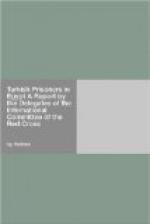According to regulation, the number of occupants of each chamber depends upon their grade. Officers up to the rank of captain are quartered four in each dormitory; captains three, and colonels two. (Some superior officers have each a separate chamber.) The orderlies are housed elsewhere. All the buildings are lighted by electricity, generated by a local plant.
Bedding.—The iron beds have wire springs, mattresses stuffed with vegetable fibre, pillows, and sufficiency of blankets, to which many officers like to add curtains and coverlets. The rest of the furniture is adequate, and easy-chairs are general.
Food.—The officers’ mess is run by a contractor. One of the officers, appointed by his comrades, is entrusted with arranging the menus and seeing them properly carried out. No limit is fixed to the choice and quantity of food. The cost must not exceed 10 piastres (about 2s.) daily, including tea, coffee, sugar, preserves, etc. The officers can get any extras which they desire either from the canteen or from the town, except alcoholic drinks, which are forbidden. The meat is previously inspected by the veterinary of the sanitary department. The bread is particularly good. Officers are given European bread, orderlies native bread. We tasted the day’s menu ourselves. No complaints with regard to food reached us. The Turkish officers take their meals in two dining-rooms, each of which seats 150. The tables are covered with cloths; the china and plate are suitable.
The orderlies’ fare is wholesome and sufficient.
Dress.—The Turkish officers are warmly and suitably clad. They can procure for themselves all kinds of toilet articles and other equipment. Most of them wear civilian costume with a fez. An Alexandria tradesman comes to the camp to take their orders.
When inspecting the orderlies we heard some of them complain of a lack of linen, especially of drawers. Surprised by this, we made an immediate inquiry, which produced the following results: the orderlies all received their regulation supply of linen, and signed a receipt in the register. A certain number of them subsequently sold the articles to their officers; these are the men who now complain of a deficiency of linen.
Hygiene.—Abundant and wholesome drinking water is laid on from the town system. The toilet supply comes to cement basins provided with many taps. The water from the lavatories and kitchens empties itself into a lake at some distance from the camp.
In the morning the officers use the baths or douches fitted up close to the barracks, and separated from each other by woven grass partitions.
The officers’ linen is washed by their orderlies in very convenient wash-houses built of wood and cement.
There are 44 Turkish W.C.’s, cemented, at a good distance from the quarters. They are arranged over cesspools 18 feet deep, disinfected every day with whitewash and cresol, and are quite odourless.




